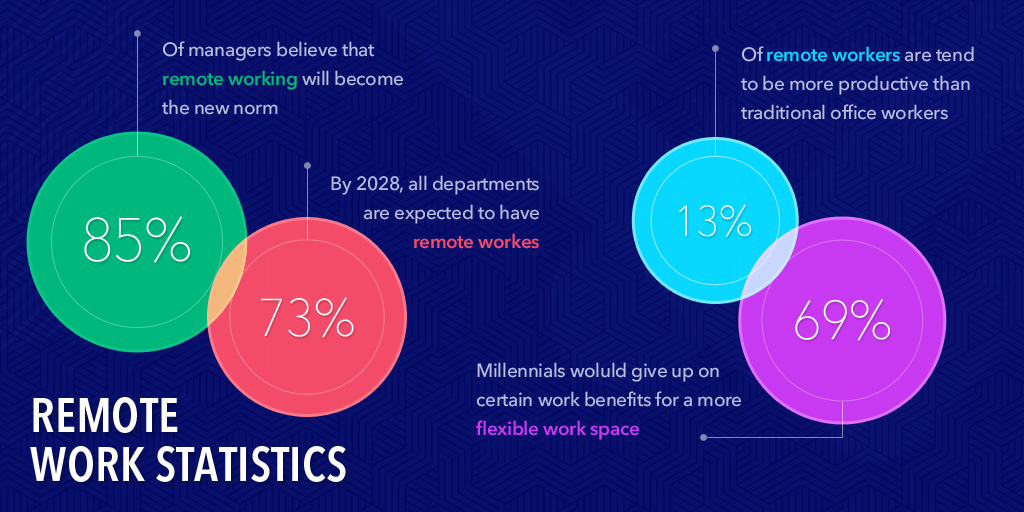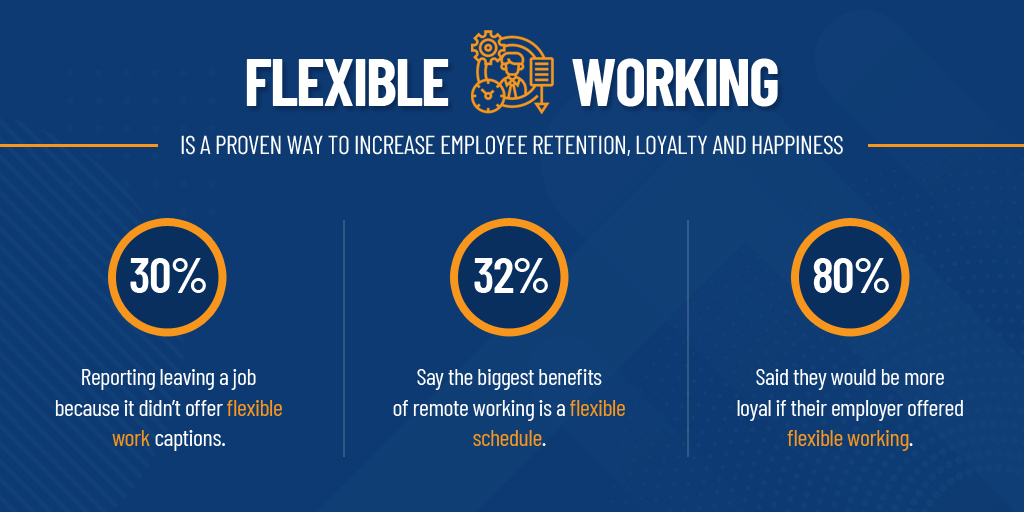Recruitment Company,Recruitment Services,
 Back to blogs
Back to blogs
Killer Remote Working Benefits For Employers
Written by : Ginni Agarwal | On :02-06-2021
Recruitment Company
Remote work provides benefits for employers. Organizations that provide remote work will always stay in profit no matter what.
Many organizations were sceptical about remote working, but they discovered that it helped them during the pandemic. It all started in 2020 and will continue in future. Remote working was on the rise, but the pandemic has accelerated it.
Remote working is not just about saving money for employers. It is about increasing productivity, employee retention and staff motivation.
Here are some statistics showing the benefits of remote working:

Even employees are in favour of remote working as they don’t want to return to the office. And employers also understand the benefits of remote work. Therefore they are promoting it. And they are doing it with the help of team applications like Slack, Zoom, Jira, and more.
There are several advantages of remote work for employers, and in this article, we will cover them one by one.
Benefits of remote work for employers
1. Lower expenses for employers
By introducing remote work into your company, you cut down the extra costs that would incur in an office. Be it the office rent, maintenance cost, and all the other costs.
For starters, remote employees require simple equipment during work from home, and all they need is a system to manage their work. In remote work, the office space remains vacant, which the company has to pay the rent. Usually, employers will cut down on the rent and save money till the office resumes.
Other things an organization can do is to cut down on paid subscriptions and look for better remote work software alternatives.
2. Increases productivity
Remote employees are more productive. According to a study, people who work remotely at least once a month are 24% more likely to be happy and productive.
It happens because employees are working from their space and therefore don’t feel the necessary pressure of the office. This way it’s less distracting for employees.
Companies can take an extra measure by increasing their productivity, and they can do it by engaging the employees.
| Also, Read: 20 Ways to engage your remote employees. |
An engaged employee will work enthusiastically and be effective in the company’s growth. Working from home reduces regular distractions like daily commuting, going out for meetings and more. Therefore, remote employees are more productive than office jobs.
3. You tend to hire the best candidates
There’s one benefit of remote work, that it has no geographical restriction. It helps to improve the company culture by bringing creativity to the workplace.
The companies are not geographically limited to hiring candidates, and they have a lot of options.
And it’s right during the current pandemic situation, it’s a little hard for companies to hire candidates, but they are trying their best by using talent acquisition strategies to their benefit.
Work location is a crucial factor, and this is where remote work stands out. There are plenty of candidates who would like to continue working remotely after the pandemic gets over. Flexible work location is now an advantage when hiring a candidate.
Now, you can hire the employee you want without limiting your location. And without disturbing the work-life balance of the employee.
4. Remote work helps with employee retention
Every company knows the value of employee retention, and they implement strategies to increase it.
Remote work helps the company to retain their star employees. Retention is a big problem for the organization as employees do the job-hopping.
But here is the advantage of remote work, it helps the employee to feel a bit relaxed while working.

Companies provide flexibility during remote work that helps to build trust with employees that you can see in the above image. Remote work is ideal for retaining employees. One of the statistics proves it, 80% of the employees would stay more loyal to the company when they get offered remote work opportunities.
And companies can increase it by understanding their employees, offering them better work-life balance.
Here are some more reasons why remote work helps in employee retention:
- No chance of losing employees if they relocate.
- Women employees are likely to carry on work during pregnancy.
- New hires will get flexibility, as it’s a driving factor among employees.
5. Remote work lowers absenteeism
Another benefit of remote work for employers is that it helps to improve engagement and to lower absenteeism, but how?
When employees are sick, they take leave because they can’t commute to work. Now, this case won’t happen during the work from home scenario.
There will be less absenteeism as employees are staying at home and don’t need to commute.
According to a survey, most employees don’t prefer commuting to work as they consider it hectic and problematic. Therefore, the instances of taking casual leaves would decrease as employees are at their home.
6. Improves mental health of employers
Employers know the importance of the mental health of employees. Stress present in the workplace is negative for workplace culture and communication among the employees.
Remote work is the answer to reduce stress in the workplace, and a stress-free person is less likely to suffer from any mental health issue.

Keeping a check on employees for signs of depression and anxiety is the right way to move forward during remote work.
Here are some reasons why employees get less stressed at work from home:
- More flexibility for employees
- No commuting
- Familiar environment
And remote work is perfect for helping employees achieve a better work-life balance.
7. Employees are satisfied during remote working
Employee satisfaction is what every business wants, but they fail to implement it in the long run. Working from home can solve a portion of this problem.
Employee satisfaction plays a role in keeping employees happy and increasing productivity.
Here the employers need to focus on employee engagement activities. Providing employees with ample flexibility during work from home.
Don’t force employees to attend the meetings, and taking feedback surveys is necessary.
Satisfied employees give it back.
They do it by doing extra work, staying longer to complete a task and lowering absenteeism.
8. Reduced turnover
Reduced turnover as a benefit of remote working for employers refers to the decrease in employee attrition rates that can occur when remote work options are offered. When employees have the flexibility to work remotely, they often experience greater job satisfaction due to the improved work-life balance and autonomy.
This increased satisfaction can lead to higher employee retention rates as workers are less likely to seek employment elsewhere. Additionally, remote work can help employers retain valuable talent by accommodating individual needs and preferences, such as flexible schedules and location independence. Overall, reduced turnover saves employers time and resources associated with recruiting, hiring, and training new employees, while also maintaining continuity and stability within the organization.
9. Faster decision-making processes
Faster decision-making processes as a benefit of remote working for employers stem from the streamlined communication and collaboration facilitated by remote work tools and practices. Without the need for in-person meetings, decision-makers can quickly gather relevant information, consult with necessary stakeholders, and make decisions efficiently using digital communication channels such as email, instant messaging, and video conferencing.
Remote work eliminates geographical barriers and allows decision-makers to connect with team members and stakeholders from anywhere, leading to quicker responses and more agile decision-making processes. Additionally, remote work encourages asynchronous communication, enabling team members to contribute ideas and feedback at their convenience, further accelerating decision-making timelines.
10. Expanded diversity in hiring
Remote work’s facilitation of hiring diversity transcends traditional boundaries, enabling employers to cast a wider net for talent acquisition. By embracing remote work, companies dismantle geographic constraints, allowing them to attract candidates from diverse cultural, socioeconomic, and geographical backgrounds.
This inclusivity not only enriches teams with a myriad of perspectives but also fosters a more innovative and dynamic work environment. Moreover, remote work’s flexibility accommodates individuals with diverse needs and preferences, such as caregivers, people with disabilities, or those residing in remote areas. This adaptability promotes a culture of inclusiveness where every employee can thrive, regardless of their circumstances. Overall, by leveraging remote work to enhance hiring diversity, companies can build stronger, more resilient teams that drive innovation and excellence in today’s rapidly evolving business landscape.
Final thoughts
An employer will benefit when an employee is happy at the workplace (during remote work). Organizations must modernize the work from home scenario to enhance their goals and to get the maximum benefit from remote work.
Here’s how remote work helps employers:
Employers looking to lower the expenses? Allow the employees to work remotely.
Organizations looking to improve productivity? Remote work helps with employee productivity.
We hope now you are convinced of all the remote working benefits for employers. Wondering how to implement it in your company. Find out here:
How to Attract and Hire Remote Employees









